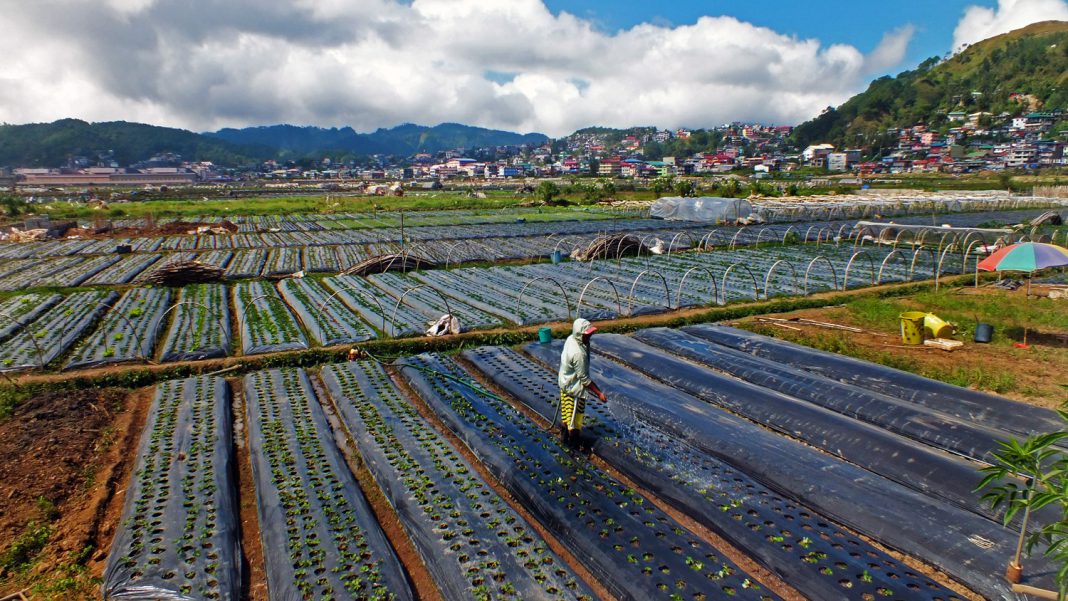In photo: Despite adversities and limited resources, farmers at Benguet Province, dubbed as the ‘Salad Bowl of the Philippines’ continue to do their best to maximize their agricultural crops production
By Victoria “NIKE” De Dios
Photo from THEPHILBIZNEWS/Mau Victa
Filipino farmers continue to face challenges even before the pandemic. The impact of the pandemic to the agricultural sector on food supplies, raw materials, logistical issues, and all supply chain issues have affected food security.
Unfortunately, there is really a decline in productivity in the agribusiness sector of the Philippines as the government continues to provide quick-fix solutions rather than long-term solutions that would help our farmers and local entrepreneurs.
The looming food security by continuously importing more food from other countries such as rice, pork, chicken and even fish, instead of providing support to the local farmers and local entrepreneurs contributed to the deteriorating agribusiness sector.
A quick adaption of available and affordable technologies for the farmers to mitigate the impact on the agricultural sector which would inevitably affect the supply of the consumers must be available especially for small-scale farmers. Through these affordable technologies, small-scale farmers can get onboard through smart agriculture initiatives while governments continuously invest also in the basics to speed up smart agricultural transformation (SAT), an expert said.
Philippine Institute for Development Studies (PIDS) Research Fellow Roehlano Briones said smart agriculture covers a wide range of technologies, some of them the small farmers can ready to handle.
“Putting up a sensor, simple sensor that will communicate with your mobile phone and the mobile phone is a simple inexpensive smartphone. That one has a greater promise of early adoption,” he said during the recent Asian Productivity Organization’s (APO) productivity talk.
Briones particularly cited the case of the Philippines where the International Rice Research Institute (IRRI) and the Department of Agriculture (DA) are innovating the Rice Crop Manager (RCM), a technology which provides scientific advice in real-time to farmers.
“So, this is something that farmers can readily adapt (to), they just need being able to access and even now through data services, mobile phones. There is nothing that will stop farmers from being able to make use of this example of smart agriculture and not have to wait a month, two months, for the extension officer to come and test their soil and give them advice on the right fertilizer regime given their crop choice,” he said.
Briones also suggested that some farmers may collaborate on a smarter best management system being offered by a service provider that makes use of drones and other automated scientific systems for pest control.
“Instead of one farmer availing of the service, it could be a group of farmers in a contiguous area, they agree that they will share this and subscribe to this service. And then together, they will collect the payment and the service provider can help this group of farmers say (by) organizing a cooperative,” he said.
“So there are solutions like these or aspects of smart agricultural technologies and I am optimistic that we will see more and more of these in the years to come,” he added.
Briones said there are other technologies that may not require large scale investment.
“It could be as simple as an upgraded version of a mobile phone that can run a particular app for doing sensor-based analysis, for purchase of actual equipment for sensor-based analysis of the farm. This could be done at the level of individual farmers however, they need to be convinced,” he said.
To accelerate SAT in APO member countries, Briones said governments must continue investing not just in sophisticated technologies but also in the basics of agricultural transformation.
These include conventional rural infrastructure and research and development (R&D), he said.
“The better your logistics, the more sense it makes for farmers to adapt ecommerce so that’s an example of all these things. As well as research and development, say the extension system to be able to deliver new products and services to farmers. There has to be an active R&D to generate this new technology,” he added.
Briones also underscored the importance of investments in human resources in the rural workforce, and in the computer literacy and openness to new techniques of farmers and fisherfolk.
“That is ultimately the key towards smart agricultural transformation,” he said.














